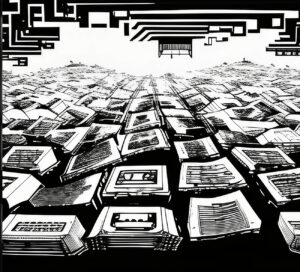The Rise of NFTs: What it Means for Global Economy
In recent years, NFTs have surged in popularity and captivated the world’s attention. With its utilization of blockchain technology to verify ownership and authenticity, NFTs have carved out a niche for themselves in the art and collectibles domain. However, their potential transcends these conventional realms, and the future of the NFT market could hold significant ramifications for the global economy.
NFTs afford the opportunity to possess and trade unique digital assets, such as art, music, and video game items. This opened up a whole new world of possibilities for creators to monetize their work and for collectors to invest in unique items. As the market for NFTs grows, so too does the potential for economic impact.
Monetizing Digital Content
In today’s digital age, creators have long struggled to monetize their digital content. While platforms like YouTube and Instagram have made it easier to reach audiences, they have also made it difficult to earn a living from digital content. Ad revenue and sponsorships can be unreliable, and it’s challenging to place a monetary value on something that can be so easily copied and distributed.
Now, enter NFTs. These unique digital assets use blockchain technology to verify ownership and authenticity. NFTs allow creators to sell their digital content as unique, one-of-a-kind items. This not only increases the value of their work but also opens up a whole new world of possibilities for collectors to invest in digital content in the same way they would invest in physical art or collectibles. As a result, NFTs could revolutionize the way we monetize digital content, offering new and exciting opportunities that were previously unattainable.
IP Rights
The use of blockchain technology to verify ownership and authenticity of NFTs has significant implications for intellectual property rights. Protecting these rights is vital in promoting innovation, creativity, and economic growth. As more people begin to monetize their digital creations, the issue of copyright infringement and intellectual property theft has become increasingly pressing. However, the use of NFTs provides creators with a powerful tool to safeguard their work and ensure that they receive appropriate compensation for its use.
When inventors, creators, and businesses have confidence that their intellectual property is protected, they are more likely to invest time, money, and resources into developing new products, technologies, and creative works. This, in turn, can encourage innovation and creativity, leading to the creation of new businesses and industries that contribute to economic growth and job creation. Protecting IP rights can also foster competition, as businesses are motivated to create superior products and services to stay competitive.
Real-world Use Cases
Our previous article Beyond Just Art: Real-world NFT Use Cases delved into the diverse industries that are actively exploring the implementation of NFTs to enhance their operations and processes.
More and more industries are exploring its potential uses. The sports, gaming, and fashion industries are among those finding innovative ways to use NFTs to their advantage. For example, NFTs can provide unique digital assets such as player cards or in-game items, offering fans and collectors new ways to engage with their favorite teams and games.
In the fashion industry, NFTs can be used to authenticate and verify the ownership of luxury items, which can help combat counterfeiting and maintain the value of these items.
Final Thoughts
The future of the NFT market holds enormous potential for driving economic impact. NFTs offer new revenue streams for creators and innovators, while also providing a way to protect intellectual property rights. Additionally, they can create new economies in industries such as art and gaming, further fueling innovation and entrepreneurship.
As the use of NFTs continues to grow and evolve, we can expect to see a range of economic benefits. The market for NFTs provides an exciting opportunity for businesses and individuals to invest in unique and valuable digital assets, which can help to drive economic growth and create new opportunities for job creation. With their potential to revolutionize the way we monetize and value digital content, NFTs are poised to have a significant impact on the global economy in the years to come.





